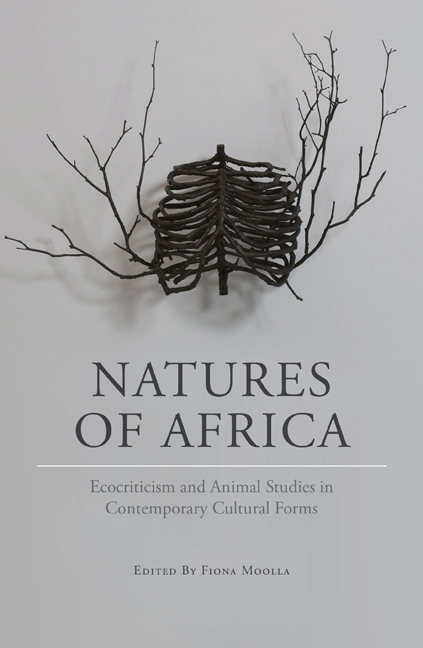Book contents
- Frontmatter
- Table of Contents
- Foreword
- Introduction
- 1 ‘Here is Some Baobab Leaf!’: Sunjata, Foodways and Biopiracy
- 2 Shona as a Land-Based Nature-Culture: A Study of the (Re)Construction of Shona Land Mythology in Popular Songs
- 3 The Environment as Significant Other: The Green Nature of Shona Indigenous Religion
- 4 Animal Oral Praise Poetry and the Samburu Desire to Survive
- 5 The Paradoxes of Voluntourism: Strategic Visual Tropes of the Natural on South African Voluntourism Websites
- 6 Towards an Ecocriticism in Africa: Literary Aesthetics in African Environmental Literature
- 7 Critical Intersections: Ecocriticism, Globalised Cities and African Narrative, with a Focus on K. Sello Duiker's Thirteen Cents
- 8 Navigating Gariep Country: Writing Nature-Culture in Borderline by William Dicey
- 9 Negotiating Identity in a Vanishing Geography: Home, Environment and Displacement in Helon Habila's Oil on Water
- 10 Human Masks? Animal Narrators in Patrice Nganang's Dog Days: An Animal Chronicle and Alain Mabanckou's Memoirs of a Porcupine
- 11 Nature, Animism and Humanity in Anglophone Nigerian Poetry
- 12 Animals, Nostalgia and Zimbabwe's Rural Landscape in the Poetry of Chenjerai Hove and Musaemura Zimunya
- About the authors
- Acknowledgements
- Notes
- Index
12 - Animals, Nostalgia and Zimbabwe's Rural Landscape in the Poetry of Chenjerai Hove and Musaemura Zimunya
Published online by Cambridge University Press: 10 May 2018
- Frontmatter
- Table of Contents
- Foreword
- Introduction
- 1 ‘Here is Some Baobab Leaf!’: Sunjata, Foodways and Biopiracy
- 2 Shona as a Land-Based Nature-Culture: A Study of the (Re)Construction of Shona Land Mythology in Popular Songs
- 3 The Environment as Significant Other: The Green Nature of Shona Indigenous Religion
- 4 Animal Oral Praise Poetry and the Samburu Desire to Survive
- 5 The Paradoxes of Voluntourism: Strategic Visual Tropes of the Natural on South African Voluntourism Websites
- 6 Towards an Ecocriticism in Africa: Literary Aesthetics in African Environmental Literature
- 7 Critical Intersections: Ecocriticism, Globalised Cities and African Narrative, with a Focus on K. Sello Duiker's Thirteen Cents
- 8 Navigating Gariep Country: Writing Nature-Culture in Borderline by William Dicey
- 9 Negotiating Identity in a Vanishing Geography: Home, Environment and Displacement in Helon Habila's Oil on Water
- 10 Human Masks? Animal Narrators in Patrice Nganang's Dog Days: An Animal Chronicle and Alain Mabanckou's Memoirs of a Porcupine
- 11 Nature, Animism and Humanity in Anglophone Nigerian Poetry
- 12 Animals, Nostalgia and Zimbabwe's Rural Landscape in the Poetry of Chenjerai Hove and Musaemura Zimunya
- About the authors
- Acknowledgements
- Notes
- Index
Summary
Chenjerai Hove and Musaemura Zimunya belong to the second generation of Zimbabwean writers – a generation of writers who were born between 1940 and 1959 (Veit-Wild 1993: 7). In their poetry, Zimunya and Hove show that they ‘feel attached to nature and [the] landscape’ of their country and its people (Veit-Wild 1988:11). A landscape, however, is also a culturescape (Wylie 2005: 149) and, as such, the two poets’ construction of and response to the landscape provide a lens through which to understand rural cultures in Zimbabwe. Besides, animals, plants, birds or insects are ‘inscripted (or even encrypted)’ in poetry for ‘aesthetic or iconic import’ (Wylie 2005: 149). Paying attention to the animals in the poetry reveals not only their symbolic import, but also the attitudes of the poets to nature in general, and animals, in particular.
This chapter is a critical analysis of the ways in which animals and Zimbabwe's rural landscape (both physical and moral) are represented in the poetry of Hove and Zimunya. My focus in the chapter is on the way nature and animal imagery are mobilised to express the poets’ conceptualisation and construction of rural Zimbabwe and the Shona people's nature-culture. I argue that the presence of animals and other aspects of nature in the poetry reveals and highlights the Shona people's embeddedness in their ecology, and exposes the relationship between the people, their land, and flora and fauna – a relationship spoilt by colonial and postcolonial exploitation of both humans and nature. The representation of animals and description of the landscape in the poetry also reveal the poets’ ecological awareness and displeasure at the abuse and destruction of nature. The rural landscape, on the other hand, works as a metaphorical map of the poets’ childhoods, real or imagined, and of their attempts at self-exploration and discovery, given that both poets subsequently chose to leave the rural world for Western education and the city.
To contextualise my argument, a brief overview of the Shona worldview regarding land and nature is necessary here. In Shona religious belief, land, whose (ultimate) owners are ‘the tutelary spirit, Mwari’ (Taringa 2013: 195), the creator, and the spirits of the ancestors who were buried in it, is considered sacred.
- Type
- Chapter
- Information
- Natures of AfricaEcocriticism and Animal Studies in Contemporary Cultural Forms, pp. 276 - 304Publisher: Wits University PressPrint publication year: 2016



